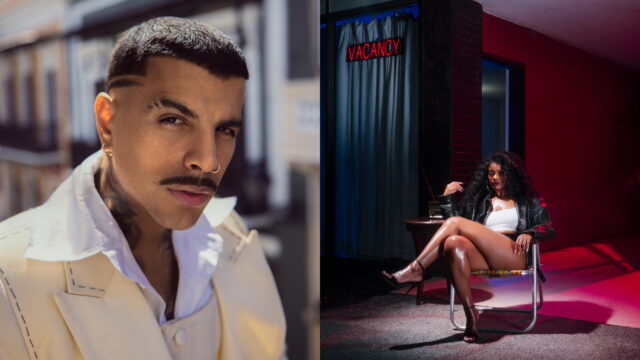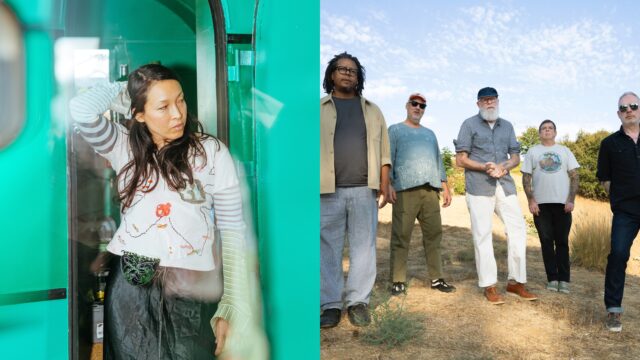Bowie: ‘Ziggy Stardust’ @ 50
Inside its sweeping cultural impact, the glam masterpiece influenced generations of musicians along the alt-rock timeline. In this TIDAL feature, artists who covered the album reflect on it — from Bauhaus to the Raconteurs and more.
by Craig Rosen
By 1971, David Robert Jones, known professionally as David Bowie, wasn’t yet a superstar, but he was one of the most interesting figures in rock ’n’ roll. In 1969 he’d had a British hit with “Space Oddity,” a dramatic, five-minute-plus orchestrated story-song about a strung-out astronaut lost in space. It reached No. 5 on the U.K. singles chart, but crashed at No. 124 in the U.S.
Perhaps more important than the song’s commercial viability was its narrative approach. In the second verse, Bowie assumed the character of the song’s protagonist, Major Tom, and sang about his predicament in first person. Bowie would use this device again on much of what would become the most significant album of his career, 1972’s The Rise and Fall of Ziggy Stardust and the Spiders From Mars. Fifty years later, it continues to be one of the most influential albums of all time — especially for the young musicians who came of age in its wake and would go on to define alternative music in the ’80s, ’90s and aughts. And though Bowie’s tour as Ziggy Stardust wouldn’t make it to North America until the fall of 1972, the music and LP art were enough to inspire new generations of artists on both sides of the Atlantic. Some of them became infatuated enough to make these songs their own.
For his Ziggy alter ego, Bowie drew upon Iggy Pop and Lou Reed (or, rather, a faux Lou he’d met after a Velvet Underground gig); British-rockabilly-casualty-with-a-messiah-complex Vince Taylor (best known for the song “Brand New Cadillac,” famously covered by the Clash); and Texas psychobilly pioneer the Legendary Stardust Cowboy; as well as Japanese fashion and kabuki theater.
“The Ziggy persona and album literally changed my life,” said Daniel Ash, guitarist in the British gothic post-punk band Bauhaus, who in 1982 released a cover of the LP’s title track that remains one of their most popular recordings. Forty years later, it’s the encore closer of the reunited band’s live sets.
Like many British youths, Ash’s awe toward Bowie was inspired by the LP and by his Top of the Pops TV performance of “Starman,” a late addition to the album because record executives said it still needed a hit single. “I will never forget, along with many others, witnessing a very beautiful and androgynous Bowie magically appearing on the TV screen one Thursday night back in 1972, singing, ‘There’s a starman waiting in the sky,’” Ash wrote to me. “What the fuck is this?! This is paradise!!!”
A decade later, Ash and his bandmates — singer Peter Murphy, bassist David J and drummer Kevin Haskins — would explore Bowie’s influence directly. “Bauhaus covering ‘Ziggy’ started off as a very late-night bit of fun in the studio between Peter, Kevin and myself,” he wrote. “When it was played back the following day to the four of us, a conversation evolved along the lines of ‘Imagine if we had the audacity to actually record this properly and release it?!’ At the time it was very much taboo to cover any Bowie song, and especially for us, as we had been accused of copying the master! So Bauhaus being Bauhaus, [we] went ahead and did the unthinkable, and to great effect!” “Starman” took Ash full circle, as Top of the Pops invited Bauhaus to perform their version of the song on the show.

Credit: Steve Jennings/WireImage.
Thousands of miles away, just outside Detroit, the album had a similar impact on the singer-songwriter Brendan Benson, known as a solo artist and a co-founder of the Raconteurs. “That was probably the reason I play music right now,” he said in a recent interview over Zoom. “My parents were young; they were still very much into cool music. My dad had a great record collection and that cover struck me: [Bowie] posing like some kind of God or alien sent from the heavens.”
As part of the Raconteurs, at dozens of live dates in 2006, Benson covered “It Ain’t Easy,” which closes side one of Ziggy. At the time, Benson didn’t realize that Bowie himself was covering the song, originally written and released by Nashville singer-songwriter Ron Davies and recorded by Three Dog Night and Long John Baldry prior to Bowie. Original or not, Benson found the tune to be “at the sweet spot in my range and voice,” he said. “It’s also incredible live. You can really play up that loud/quiet thing.” In the Raconteurs’ version, captured onstage and released as a B-side, Benson does his best Bowie while his fellow co-founder Jack White channels guitarist Mick Ronson. Interestingly, White also performed another Ziggy track, “Moonage Daydream,” in early live sets by the White Stripes.
When hard alt-rockers Eagles of Death Metal decided to record their version of “Moonage Daydream,” they opted to do it at White’s Third Man Records Booth in Nashville, on a refurbished 1947 Voice-o-Graph machine. That recording later turned up on 2019’s Eagles of Death Metal Presents Boots Electric Performing the Best Songs We Never Wrote. “Because [Ziggy] is the future and it was so far ahead of its time, I thought it would be fascinating to record it as though it were a Robert Johnson song,” frontman Jesse Hughes told me over Zoom from Vienna, where the band was on tour. “I brought the whole band into this little booth, and we did that all at once on that one microphone and it spit out the record and that’s what we got.”
Hughes’ Ziggy encounter came early. “It was at a Christmas party that my parents were having,” he said. “I must’ve been 4 years old. … It was the first time I had that cover put into my hands, and I was like, ‘What, what is this?’ And I remember it kind of scared me. My dad saw the look on my face and he said, ‘You think that’s scary? Listen to this!’ He put it on — and that album scared me. I was an early bloomer.”
Years later, Ziggy and Bowie had become sources of comfort for Hughes. “Once I moved to Palm Springs, [Calif.], I related to it on a whole different level, because I was into weird shit,” he said. “I didn’t have a lot of friends. I wore a pink triangle. I related to it in a sense that it gave me escape. … Everything about it. Everything about the record is so quintessential, so inevitable. There’s an inevitability to the album that you cannot deny.”
*****
“It Ain’t Easy” was recorded in July of 1971, and is Ziggy’s sole holdover from the sessions for Bowie’s Hunky Dory. To this day it has a special place in the hearts of two musicians who appear on it: keyboard great Rick Wakeman and backing vocalist Dana Gillespie, a singer and actress whose golden-age exploits made her part of rock ’n’ roll lore.
Gillespie was “surprised that Bowie had chosen this song, as he hadn’t written it himself,” she said. “But I think the lyrics somehow tickled him.” (Versions of Chuck Berry’s “Around and Around,” retitled “Round and Round,” and Jacques Brel’s “Amsterdam” were originally recorded and slated for the album, but dropped with the inclusion of “Starman.”)
As for Wakeman, the track remains a highlight for the simple reason that he was able to play harpsichord on it — instrumentation that “was rare back then,” he recalled.
The sessions for Ziggy began officially only a few months after Bowie and the band soon to be rechristened the Spiders From Mars had completed work on Hunky Dory. The recording was helmed by super-producer/engineer Ken Scott, known for his earlier work with the Beatles, Bowie and many others. “Ken was like a band member, really,” said Wakeman, who declined Bowie’s offer to join the Spiders in favor of becoming a member of the prog-rock juggernaut Yes. “He knew how to get David’s ideas onto tape, and that was always the key to a good producer.”
Though he didn’t play on Ziggy Stardust, keyboardist Mike Garson toured in support of the album beginning in September 1972 and worked with Bowie at various points throughout his career. Today, he continues to play Bowie tribute shows. While he acknowledged Bowie’s genius, he also pointed to “the power of [bassist] Trevor [Bolder], [guitarist/vocalist] Mick [Ronson] and [drummer] Woody [Woodmansey], and the fact that they had played a few years together before it really blasted into that fame,” he said. “There’s nothing like having a band. That’s why the Beatles are the Beatles and the Rolling Stones are the Rolling Stones.”

Credit: Brian Ward/The David Bowie Archive.
For Garson, Bowie launched Ziggy at just the right time. “It was the next thing that had to occur after the Beatles,” he added. “Certainly it was a great album and it was a great character to hide behind, because he was nervous as an artist. He only got comfortable in his own skin way later, when I was touring with him again in the ’90s. So you could hide behind it if you have great music and great tunes.”
*****
Those songs included Ziggy’s dramatic opening track, “Five Years,” a work that resonates powerfully in the age of climate change. “News guy wept and told us Earth was really dying,” Bowie sings. That pertinence was part of why the pathbreaking alt-country-rock group Cowboy Junkies chose to record the song and feature it as the lead track on their recent covers project, Songs of the Recollection.
For the band’s founding guitarist and songwriter, Michael Timmins, the gateway to the album was his older brother, John. Fast forward to about five years ago and the Cowboy Junkies found themselves playing a series of dates at the Monarch Tavern, in Toronto, with the theme of “dead heroes.” “I had listened to Ziggy Stardust,” said Timmins, “so we decided to play ‘Five Years,’ because I thought Margo [the group’s singer and Timmins’ sister] could do a good job on it.”
“There’s a certain relevance to it,” he added, “even though the lyrics are a bit opaque. There’s this foreshadowing of the apocalypse on many different levels, which we’ve seen a little bit of daily.”
What Bowie couldn’t have predicted was Ziggy’s continuing impact. Though the LP wasn’t a huge hit Stateside (it peaked at No. 75 on the albums chart back then, while “Starman” stalled at No. 65), it paved the way for Bowie to become a star in America. As Bowie was touring Ziggy, “Space Oddity” was rereleased in America to promote the reissue of David Bowie, his second album, retitled Space Oddity. Both cracked the top 20 of the U.S. charts. David Bowie had arrived.
Bowie famously ended his run as the iconic character at a London concert on July 3, 1973 — a move that stunned his fans and even some of the Spiders and Bowie insiders. But not Gillespie. “I was with [Bowie manager Tony] Defries, Bowie and [Bowie’s spouse] Angie on the night before he announced onstage about killing off Ziggy,” she remembered. “Everyone else was totally shocked when it happened!”



